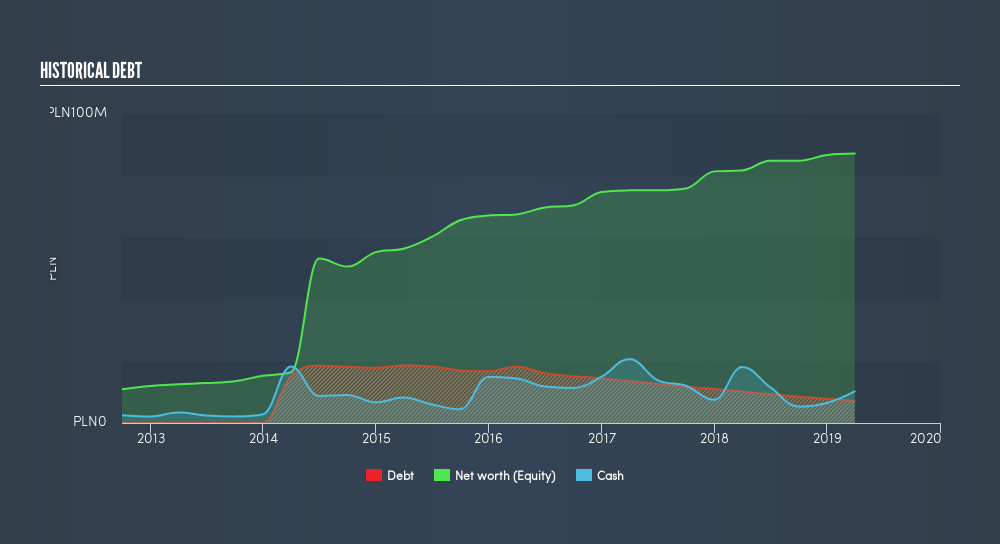
Legendary fund manager Li Lu (who Charlie Munger backed) once said, 'The biggest investment risk is not the volatility of prices, but whether you will suffer a permanent loss of capital.' It's only natural to consider a company's balance sheet when you examine how risky it is, since debt is often involved when a business collapses. We can see that Ailleron S.A. (WSE:ALL) does use debt in its business. But is this debt a concern to shareholders?
Why Does Debt Bring Risk?
Debt assists a business until the business has trouble paying it off, either with new capital or with free cash flow. In the worst case scenario, a company can go bankrupt if it cannot pay its creditors. While that is not too common, we often do see indebted companies permanently diluting shareholders because lenders force them to raise capital at a distressed price. Of course, plenty of companies use debt to fund growth, without any negative consequences. The first step when considering a company's debt levels is to consider its cash and debt together.
See our latest analysis for Ailleron
What Is Ailleron's Net Debt?
You can click the graphic below for the historical numbers, but it shows that Ailleron had zł7.01m of debt in March 2019, down from zł12.0m, one year before. But it also has zł10.2m in cash to offset that, meaning it has zł3.19m net cash.

How Healthy Is Ailleron's Balance Sheet?
The latest balance sheet data shows that Ailleron had liabilities of zł23.3m due within a year, and liabilities of zł11.9m falling due after that. Offsetting this, it had zł10.2m in cash and zł44.6m in receivables that were due within 12 months. So it actually has zł19.6m more liquid assets than total liabilities.
This excess liquidity suggests that Ailleron is taking a careful approach to debt. Because it has plenty of assets, it is unlikely to have trouble with its lenders. Simply put, the fact that Ailleron has more cash than debt is arguably a good indication that it can manage its debt safely.
In fact Ailleron's saving grace is its low debt levels, because its EBIT has tanked 28% in the last twelve months. Falling earnings (if the trend continues) could eventually make even modest debt quite risky. The balance sheet is clearly the area to focus on when you are analysing debt. But it is future earnings, more than anything, that will determine Ailleron's ability to maintain a healthy balance sheet going forward. So if you're focused on the future you can check out this free report showing analyst profit forecasts.
But our final consideration is also important, because a company cannot pay debt with paper profits; it needs cold hard cash. Ailleron may have net cash on the balance sheet, but it is still interesting to look at how well the business converts its earnings before interest and tax (EBIT) to free cash flow, because that will influence both its need for, and its capacity to manage debt. During the last three years, Ailleron generated free cash flow amounting to a very robust 85% of its EBIT, more than we'd expect. That positions it well to pay down debt if desirable to do so.
Summing up
While we empathize with investors who find debt concerning, you should keep in mind that Ailleron has net cash of zł3.2m, as well as more liquid assets than liabilities. And it impressed us with free cash flow of -zł1.9m, being 85% of its EBIT. So we don't have any problem with Ailleron's use of debt. Above most other metrics, we think its important to track how fast earnings per share is growing, if at all. If you've also come to that realization, you're in luck, because today you can view this interactive graph of Ailleron's earnings per share history for free.
When all is said and done, sometimes its easier to focus on companies that don't even need debt. Readers can access a list of growth stocks with zero net debt 100% free, right now.
We aim to bring you long-term focused research analysis driven by fundamental data. Note that our analysis may not factor in the latest price-sensitive company announcements or qualitative material.
If you spot an error that warrants correction, please contact the editor at editorial-team@simplywallst.com. This article by Simply Wall St is general in nature. It does not constitute a recommendation to buy or sell any stock, and does not take account of your objectives, or your financial situation. Simply Wall St has no position in the stocks mentioned. Thank you for reading.
About WSE:ALL
Outstanding track record and good value.
Market Insights
Community Narratives



